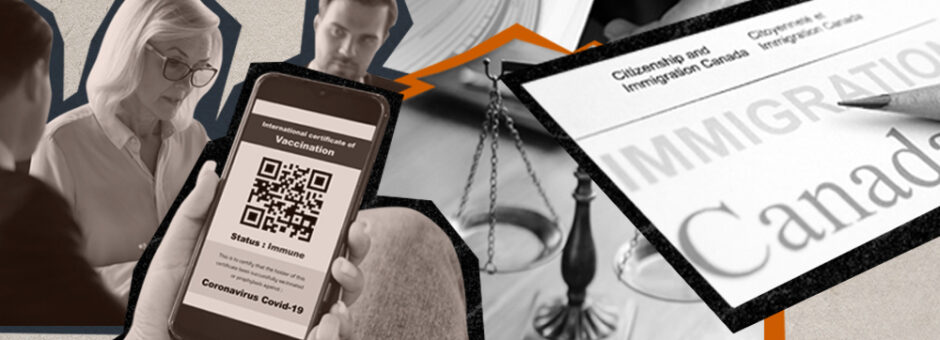Updating business managers with what you need to know, right now:
This quarter’s legal update looks at immigration and employment law, mainly with regards to the ongoing Covid-19 pandemic.
Immigration lawyer Stanley Leo discusses border re-openings, travel protocol, Immigration Department delays, and the recent federal election.
Employment lawyer James D. Kondopulos looks at vaccination mandates, unvaccinated employees, and a recent B.C. case involving transgender rights in the workplace.
Pressed for time? Skip ahead.
Immigration law with Stanley Leo
· S1:01 Border Re-Openings
· S1:02 Hurdles of International Travel and Unvaccinated Children.
· S1:03 Immigration Canada Delays
· S1:04 Immigration and the Recent Election
Employment Law with James D. Kondopulos
· S2:01 Workplace Vaccination Mandates
· S2:02 Exceptions, Accommodation, and Non-Vaccinated Employees
· S2:03 Transgender Workplace Rights
Interview with Stanley Leo, Immigration Lawyer at Lowe & Company
S1:01
Border Re-Openings
GB: Were you surprised by how quickly the borders opened with the US, and then the world?
Yes. By July, fully vaccinated travellers no longer had to quarantine upon entry. In August, Americans who were fully vaccinated could come to Canada for just about any reason, and no longer had to have what was previously called a non-optional or non-discretionary purpose for seeking entry to Canada. In September that restriction was further lifted for fully vaccinated travellers around the world. The logistics and the practicality of travel, however, are still nowhere near normal. There are lots of hoops to jump through.
S1:02
Hurdles of International Travel and Unvaccinated Children.
GB: One of the necessities of international travel is the requirement to take a Covid test before entry to Canada.
I have clients that leave and re-enter Canada regularly, and I have to tell them that they need to get a test every time they seek re-entry. That negative test prior to entry is a critical piece of the puzzle, and some people do get surprised with a positive result. There are lists of exemptions to pre-arrival testing, but they are very limited so in most cases, it’s still best to limit international travel as much as possible right now.
GB: What do families attempting to enter Canada with unvaccinated children need to know?
There’s a pretty long list of rules that apply to that situation. Oftentimes families are coming from countries that have less access to vaccination, and only the parents are vaccinated. Generally speaking, minor children with fully vaccinated parents are likely able to enter Canada though there are still some restrictions. What could become a problem are new vaccination rules for domestic flights within Canada. This is important because the initial point of entry to Canada is often not the final destination in Canada, so that’s where any sort of quarantine requirements that may exist will be triggered. Depending on exemptions, some families with unvaccinated children may have difficulty boarding connecting flights together to their final destinations, even if they are otherwise allowed to enter Canada.
S1:03
Immigration Canada Delays
GB: Is it still a viable solution for companies to source candidates from outside of Canada?
It depends on your time expectations. The one word that might summarize the immigration department experience right now is delay.
Their computer systems, generally, have been terrible. Every one of the new Immigration Department portals have been having major problems. For example, many employers must use a portal called the Employer Portal as part of the International Mobility ProgramThere are lawyers who have been waiting months for their client to get access to their account again, and timeframes do not appear to be improving.
GB: What is the Immigration Department’s explanation for these delays?
The generic response is that they’re focussed on matters related to Afghan nationals. While I don’t doubt that that’s an element to it, that still also doesn’t address the fact that their computer systems are chaotically non-functional. It feels like the problem is probably wider than that.
GB: Do you have any information about who might be the next minister?
No, I’m sorry, I don’t have any line in on that conversation. I would say that whoever comes in, I hope he or she is a tech expert. That seems to be one of the major problems.
GB: What can you tell us about the Chinook system that’s been making news?
It appears to be some sort of internal Excel spreadsheet that the government uses to help with the high volumes of applications they receive. Some temporary residency applications are basically being distilled by algorithms, and officers then either refuse or approve the applications, with very little nuance given to the particular applicant’s background. There’s really a lot of concern from the immigration bar about how it’s going to impact a vast number of applicants, especially those from countries that the system may be biased against. I’m not blind to the demands of the government department, but there are genuine concerns about how it’s used practically, and how it affects the lives of so many people.
S1:04
Immigration and the Recent Election
GB: Do you expect the recent Canadian federal election to have immigration law ramifications?
The election basically maintained the status quo, so it’s unlikely that there will be any politically driven decisions to lower the number of immigrants coming to Canada. But, to be frank, all the major parties do recognize the need for relatively high immigration levels. Some might be more favorable to different forms of immigration, but it does seem like high immigration levels are consistently accepted.
Interview with James D. Kondopulos, Employment and Labour Lawyer/ Founding Member and Partner at Roper Greyell LLP
S2:01
Workplace Vaccination Mandates
GB: Most of the recent employment law conversation has centered around mandatory vaccination programs. Do you have any insight to share?
It’s interesting that you refer to vaccination programs as being “mandatory”. That is the language that’s being thrown around in the media and by other legal commentators, but with some narrow exceptions, the programs are at present not truly mandatory. They require employees to prove vaccination status, but for those who choose not to vaccinate, or have a protected human rights reason not to do so, there may be an alternate path which involves enhanced PPE, including masking, regular COVID-19 testing, and so on. If none of that is workable, or if the employer is being particularly aggressive about it – and that may be justified in particular work settings or work environments – the final option is to simply hold the employee out of work on a job protected leave – an unpaid leave – because, of course, there are no duties being performed. If, at any time, the employee becomes fully vaccinated, he or she can return to the job.
In terms of terminations on a just cause basis for refusing to become vaccinated, I think you start to get on thin legal ice. There are of course exceptions and there is, in addition, always the possibility of terminating employment on a without cause basis, provided you’re not running afoul of human rights legislation and you give appropriate termination notice or pay in lieu of notice.
S2:02
Exceptions, Accommodation, and Non-Vaccinated Employees
GB: There has been talk of exceptions. How do you see these playing out?
Each of these demand a unique, case by case approach. The medical exemptions available are fairly narrow, and principally have to do with allergic reactions, and inflammation around the heart, which are not typical situations. The faith based exceptions, again, are quite narrow, and ultimately turn on whether the belief is sincerely held, and consider whether a faith leader will provide support for that particular conviction or thinking.
GB: Perhaps remote work will be a popular option for employers attempting to accommodate unvaccinated employees.
My advice to employers is to approach that carefully, particularly if such an arrangement is not desirable from your perspective and in the best interests of your business and operation. There might be a concern about creating a precedent or sending a signal to the rest of the workforce. Leaving aside legitimate human rights-related cases, if an individual is unwilling to comply with workplace safety standards, a job protected leave may be more appropriate, and because the employee will not be performing duties, it’s without pay.
GB: What about employers who are hesitant to dismiss employees that are valuable to their operation?
This is an important issue in any industry where labour comes at a premium, such as construction, or restaurants and hospitality. If an employer mandates vaccination, it may experience a flight of staff – and good, qualified members of staff. Employers may be tempted to temper their approach and moderate their demands, for fear of not being able to retain or recruit employees. This may be a case where government intervention is required to ensure that everybody is playing by the same rules. Otherwise, employers who go to bat and try to do the right thing and comply with an appropriate elevated safety standard are penalized. The provincial government has acted already in long-term care settings, and more recently in health care. Perhaps it is time to go beyond that.
S2:03
Transgender Workplace Rights
GB: With all the focus on Covid-19, have there been any other interesting employment law developments which may have flown under the radar?
The BC Human Rights Tribunalvery recently issued a human rights award against a restaurant where a transgender employee was, among other things, not being referred to by their desired pronouns. That, of course, is an issue which we’ve seen a fair amount of in the media and legal commentary recently. I know that in my line of work, when we appear in court, we have to indicate to the court what our preferred pronouns are. This is the result of practice directions issued by the BC Supreme Court and other levels of court regarding the use of gender-inclusive language in court proceedings.
I should add, my firm will shortly be doing an online on-demand course dealing with transgender issues in the workplace. This resource will provide an update on the law regarding discrimination on the basis of gender identity and expression, and will provide guidance on related workplace issues: Seminars | Workplace Law Education Series | Roper Greyell LLP. (Editor’s note: Goldbeck will also share this resource through our social media channels when it becomes available)




